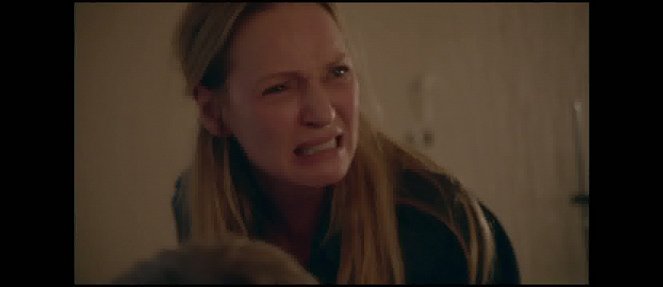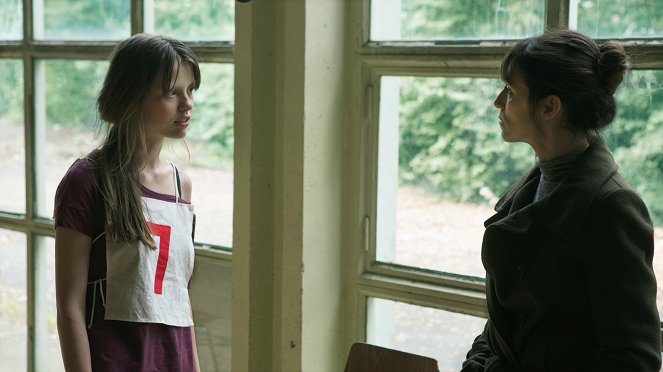Directed by:
Lars von TrierScreenplay:
Lars von TrierCinematography:
Manuel Alberto ClaroCast:
Charlotte Gainsbourg, Shia LaBeouf, Stellan Skarsgård, Stacy Martin, Willem Dafoe, Jamie Bell, Connie Nielsen, Mia Goth, Sophie Kennedy Clark (more)VOD (3)
Plots(1)
Videos (1)
Reviews (9)
(Volume I)… which settles down a bit in the second half, when the forced overlaps disappear, and the director returns to his favorite theme of "woman as evil incarnate." This makes the film less long-winded but then comes Bond, 3+5, and golden rain, and the awkward impressions are broken even more than in Melancholia; please shrink the Director's Cut to two hours and without the asexual sex, though that's not really the point here (unexpectedly, right?).
()
Simply, the second half of the film, which by the way lasts two hours, is even more tedious and boring than the first part, and it has a strange ending, a strange overall culmination, which will leave you feeling like you missed something. I'm not particularly enthusiastic about this double film. It's not badly directed, but at the same time, it doesn't give the viewer much either. The pseudo controversies are sometimes apparent, but it's part of the film and the subject matter. It's just long and actually quite empty.
()
We left the comedy part behind us and now we get the sad part. So the viewer isn’t entertained, but he’s still curious. Of course, there’s a touch of S+M in the movie, but it’s an act of despair, not lust, and so the controversy somehow fades. The story of Fido’s life was certainly worth telling and I really liked that scene with the tree. The worst tasteless slap in the face of the whole story is the ending which more or less ruins the catharsis and doesn’t shock but revolts. It seems very forced. Or the loose ends with Jamie Bell and Willem Dafoe. Is it Lars’s work or the censor’s? Shame, maybe the director’s cut will make more sense. Hey Joe.
()
The second Nymph()maniac romp is such a specific and unique product that I've decided to tolerate even the opinions of the writers of the "boo!" and below average reviews. Before I read the whiny compost of hypocritical declamations, of course. The menacing Director's Cunt is truly essential here, unlike in the first volume, and given its existence the abridged version need not be addressed at all. The uniqueness of the second, three-hour-long Nymph()maniac lies in the unique and almost constant transitions out of the medium, often related to the person of the director, which thus definitively underlines his egomania, but nonetheless opens the gateway to our perception of him through the means he controls (i.e., writing and directing), instead of those means (rhetoric) where he is more at a loss and constantly incurring considerable problems. The film thus comments not only on that famous Cannes Hitlerian empathy, accusations of misogyny, problems with censorship, or the expressive depiction of un-aestheticized nudity and violence. And it does so with a big fuck off in a similarly decently suggestive home-made abortion, subsequently likened to the slaughter of cattle, despite the fact that only a minute ago we could have been showering our love on a breathing aborted fetus. The director's role as a celebrity for senior actors suits Trier, which is why he can afford to deliberately and gleefully rip off scenes from his previous films, almost verbatim, in order to elicit audience reactions that rely on knowledge of the source instead of building the scene on its own merits (a child catching snow). Despite how terribly meta the whole thing is, it's fascinating how the individual sequences work when they're freed from a narrative superstructure for extended periods of time, and for example the whole SM passage with the absolutely bravura Jamie Bell is set in context so seamlessly and yet is so different that it actually underlines the whole idea of Trier's work, where there are no directorial mistakes, only audience ones.
()
I have seen and am reviewing only the director’s cut of both parts of Nymph()maniac. For five and a half hours, the narrative about various methods of physical (self-)satisfaction, which is unsatisfying for viewers, confronts the two greatest themes of all Freudian directors – sex and death. The most striking merger of the two occurs during a drastic miscarriage, at the end of which Joe trembles with arousal, and in the chapter with the dying father, whose black-and-white picture and tone of emotional blackmail give such a (pseudo)artistic impression that it is most likely one of von Trier’s many tactics aimed at depriving viewers of what they want. In the course of both films, he employs a disturbing number of diversions, notional parentheses, jumps in time and changes in the style of the narrative in order to evoke a feeling of unease that makes it impossible to unobtrusively construct a story. The film brings to mind Zanussi with its hypermedia-style encyclopaedic layering of information, Buñuel with its thematisation of fetishes and unstable identity, Bergman with the intimate exploration of relationships, and Tarkovsky with its spiritual excitement (including a direct quote from The Mirror). Though this eclectic and intermedia compilation of styles is held together by the framework narrative, I would not call it a coherent form. How could there be a coherent film that is constructed as a dialogue between two seemingly incompatible worldviews (asexual and nymphomaniac) into which von Trier constantly tries to draw the viewer, whether by shattering visual taboos (I have never seen a more graphic depiction of abortion in a film) or by breaking down the fourth wall between fiction and reality (the camera reflected in a mirror, obvious parallels between the provocatively free-thinking views of Joe and von Trier himself). Despite all of the sexual explicitness and the extreme suffering of the female protagonist, the treatment of the female body seemed less exploitative to me than in, for example, Blue Is the Warmest Colour. Even though the woman becomes a sexual object several times, especially in the first part, and through most of the film her happiness depends on the man’s stamina, availability and abilities, her depiction elicits pain, compassion and disgust more frequently than pleasant feelings. In this context, the most beneficial scene of the director's cut may be the aforementioned abortion, which, with an openness that I believe will be particularly unpleasant for men, demonstrates throughout both films the intensified forms of defending a woman’s right to decide what she does with her own body. Showing us what we do not want to see is closely connected with consideration of that which we do not want to think about. In my opinion, such a provocation makes sense, like Nymph()maniac as a whole. 75% for part I, 80% for part II.
()



Ads